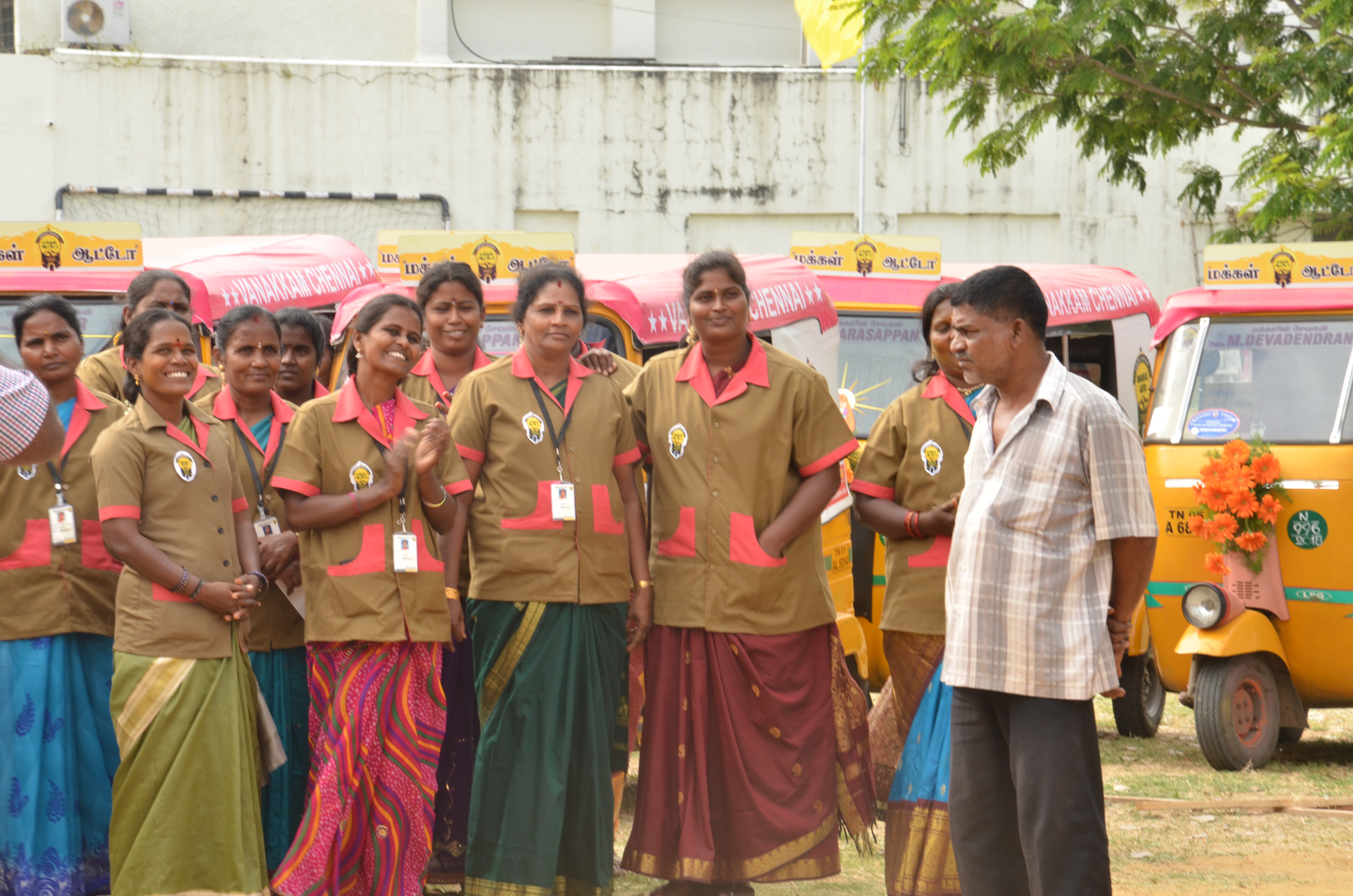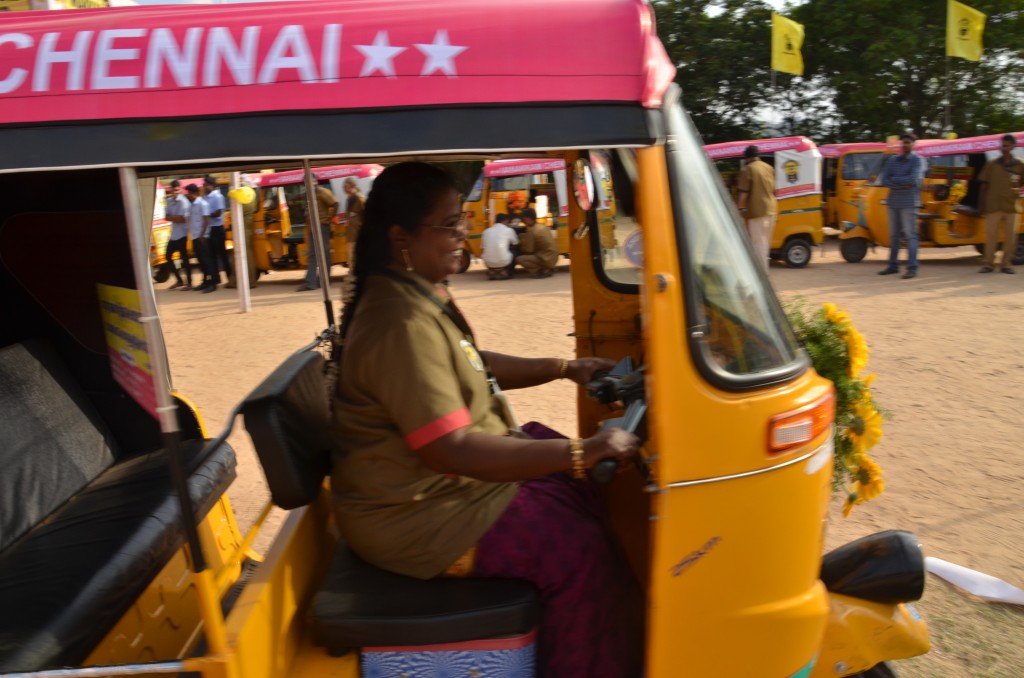India’s women tuk-tuk drivers
 If you were to land in Chennai in southern India one of these days, do not be surprised to see sari-clad women with khaki jackets, zipping around the city and ferrying passengers in black-and-yellow tuk-tuks, known as autorickshaws in India.
If you were to land in Chennai in southern India one of these days, do not be surprised to see sari-clad women with khaki jackets, zipping around the city and ferrying passengers in black-and-yellow tuk-tuks, known as autorickshaws in India.
These women have been trained and employed by Makkal (which means “people” in Tamil) Auto, a transport service that runs a high-tech and high-security auto fleet for women, by women.
For ordinary people in this bustling southern city, the autorickshaw or the “auto” is both a boon and a bane. Even as it provides that crucial last mile connectivity, particularly to the large numbers of working women who are dependent on public transportation, there have been serious security issues to deal with, apart from the usual harassment over the arbitrary charging of fares.
Makkal Auto, which is the brainchild of Mansoor Ali Khan, a 27-year-old software development professional, solves two crucial problems in one go – it not only provides a respectable, lucrative livelihood option to women in need but also makes the daily commute of their well-to-do counterparts safe and hassle-free. To book an auto, all one needs to do is call a service number or download their app on the smart phone.
Khan runs his own software development firm and has been keenly following the public discourse on issues surrounding the mobility of women and increasing gender violence. Recently, he decided to use his skills to make a difference. Instead of a regular meter to calculate the fare, Khan’s autos come fitted with a tablet PC that has an embedded camera, an audio recorder and a GPS tracking system and runs on a special software.
Normally, the touchscreen displays the details of the driver, including a photograph, name, license and mobile number. If the passenger taps on the “Help” button, it sets in motion a series of actions:
“Immediately, the camera and audio recorder become active and give a direct feed to our call centre. At the same time, it also records all that is going on in the vehicle. Meanwhile…our staff inform the local police and provide them with the exact coordinates of the auto as well as other crucial information that can come in handy. Right now we are trying to get permission to link the tablet feed with the police server so that the SOS signal can directly reach them as well. This facility is available on all our autos whether run by women or men,” explains Khan.
Apart from ensuring security, the innovator has worked out other uses for the tablet. For one, it tracks the route of the autorickshaw so that the driver is not tempted to take a winding route to earn some extra cash. “And we are selling advertisement space on this device to generate some extra revenue for the drivers. Ads of local restaurants, sales announcements and film promos are already being shown,” he adds.
If the commuters are happy today, then so are the female drivers, who are an integral part of the Makkal Auto success story. Once lonely, destitute and struggling, they have become trendsetters in their own right.
The drivers speak
Srikala, 35, who has separated from her husband, has been driving a Makkal Auto for many months now and is pleased with the way things have worked out for her. “Driving a Makkal Auto is a win-win. They run a call centre through which they generate business for me. The struggle is less and income is assured. Moreover, if I ever encounter a problem on the road or am harassed by traffic cops, they immediately come to my rescue,” she says.
Srikala’s routine is set – she begins her day with “School Savaris” (driving children to school) and winds up by six in the evening. Though she does ferry male commuters who “look relatively harmless, such as old men or those accompanied by their family,” she likes to stick to picking up female passengers.
Loganayaki, 27, has taken up this profession to improve her earnings. “Before I got into this profession, I was a home care nurse. My salary was much lesser and I worked odd hours and night shifts in unknown people’s homes. Driving an autorickshaw is a far better proposition. After paying for the auto rental and petrol expenses, I make about Rs 600 a day. I know I can earn much more as I gain more experience and make contacts,” says the woman, who has been driving a Makkal Auto since the last six months.
How do they deal with the male rickshaw drivers, who are greater in number and notorious for their bad attitude on the road?
According to Loganayaki, she has mostly been treated with respect. “Some have even come forward to help me kick-start my auto when the engine died on me unexpectedly. I won’t deny that it’s not been a smooth sailing all the way. There have been a few snide and sarcastic remarks by passers-by on how “women should be in their homes and not on the road,” but on the whole, most have reacted positively,” she points out. Nevertheless, what matters to her is the support she has got from her family. Loganayaki’s daughter never fails to introduce her “independent and bold mother” to her friends.
Getting a job at Makkal Auto
Once a woman decides to become an auto driver, the Makkal Auto management takes over: they provide a three-month training and then help out with getting a license. Once the driver is ready for the road, she can hire an autorickshaw from them for a charge of 150 Rupees (around 3 dollars) a day, which is much lower than the rental rate of 300 Rupees (around 6 dollars) in the open market.She also gets an insurance cover of 300,000 Rupees (around 6,000 dollars).
What’s more, there are no fixed timings that she needs to follow. “But most women find it convenient to start by seven in the morning, after they have done a bit of their own household work,” Makkal chief Khan shares, “And they wind up in the evening to get home to their families. A few are game to drive till around 8.30 pm.”
As auto drivers, they easily earn between 1,000 to 1,500 Rupees (around 20-25 dollars) a day. As a policy, Makkal Auto drivers refuse to pocket tips, but there is a tip box where commuters can make donations if they so wish. This money is used by the Makkal Auto trade union for the education of the employees’ children. Once the women have completed 1,000 days of driving, Khan plans to give away the so-far rented auto to the drivers. “An auto costs around 250,000 Rupees (around 5,500 dollars) if you include its registration fee. So its financially feasible for us to gift the autos to these women after a 1000-day run,” he says.
As far as social experiments go, Khan’s has thus far worked well, “Combining livelihood generation for women and ensuring their safety in public spaces has proved to be mutually beneficial. If I, as a private operator have been able to achieve success imagine the scale of impact if the government comes on board.” Here’s hoping it can be scaled up to reach out to many more women.
Author: Hema Vijay
Editor: Manasi Gopalakrishnan
This is a story from Womens Features Service.







